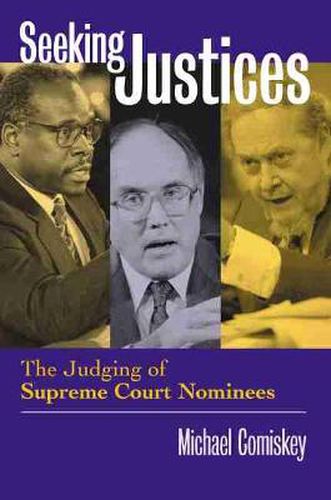Readings Newsletter
Become a Readings Member to make your shopping experience even easier.
Sign in or sign up for free!
You’re not far away from qualifying for FREE standard shipping within Australia
You’ve qualified for FREE standard shipping within Australia
The cart is loading…






In the long shadows cast by the Robert Bork and Clarence Thomas nominations, Supreme Court confirmations remain highly contentious and controversial. This is due in part to the Senate’s increasing reliance upon a much lengthier, much more public, and occasionally raucous confirmation process - in an effort to curb the potential excesses of executive power created by presidents seeking greater control over the Court’s ideological composition. Michael Comiskey offers the most comprehensive, systematic, and optimistic analysis of that process to date. Arguing that the process works well and therefore should not be significantly altered, Comiskey convincingly counters those critics who view highly contentious confirmation proceedings as the norm. Senators have every right and a real obligation, he contends, to scrutinize the nominees’ constitutional philosophies. He further argues that the media coverage of the Senate’s deliberations has worked to improve the level of such scrutiny and that recent presidents have neither exerted excessive influence on the appointment process nor created a politically extreme Court. He also examines the ongoing concern over presidential efforts to pack the court, concluding that stacking the ideological deck is unlikely. As an exception to the rule, Comiskey analyzes in depth the Thomas confirmation to explain why it was an aberration, offering the most detailed account yet of Thomas’s pre-judicial professional and political activities. He argues that the Senate Judiciary Committee abdicated its responsibilities out of deference to Thomas’s race. Another of the book’s unique features is Comiskey’s reassessment of the reputations of twentieth-century Supreme Court justices. Based on a survey of nearly 300 scholars in constitutional law and politics, it shows that the modern confirmation process continues to fill Court vacancies with jurists as capable as those of earlier eras. We have now seen the longest period without a turnover on the Court since the early nineteenth century, making inevitable the appointment of several new justices following the 2004 presidential election. Thus, the timing of the publication of Seeking Justices could not be more propitious.
$9.00 standard shipping within Australia
FREE standard shipping within Australia for orders over $100.00
Express & International shipping calculated at checkout
In the long shadows cast by the Robert Bork and Clarence Thomas nominations, Supreme Court confirmations remain highly contentious and controversial. This is due in part to the Senate’s increasing reliance upon a much lengthier, much more public, and occasionally raucous confirmation process - in an effort to curb the potential excesses of executive power created by presidents seeking greater control over the Court’s ideological composition. Michael Comiskey offers the most comprehensive, systematic, and optimistic analysis of that process to date. Arguing that the process works well and therefore should not be significantly altered, Comiskey convincingly counters those critics who view highly contentious confirmation proceedings as the norm. Senators have every right and a real obligation, he contends, to scrutinize the nominees’ constitutional philosophies. He further argues that the media coverage of the Senate’s deliberations has worked to improve the level of such scrutiny and that recent presidents have neither exerted excessive influence on the appointment process nor created a politically extreme Court. He also examines the ongoing concern over presidential efforts to pack the court, concluding that stacking the ideological deck is unlikely. As an exception to the rule, Comiskey analyzes in depth the Thomas confirmation to explain why it was an aberration, offering the most detailed account yet of Thomas’s pre-judicial professional and political activities. He argues that the Senate Judiciary Committee abdicated its responsibilities out of deference to Thomas’s race. Another of the book’s unique features is Comiskey’s reassessment of the reputations of twentieth-century Supreme Court justices. Based on a survey of nearly 300 scholars in constitutional law and politics, it shows that the modern confirmation process continues to fill Court vacancies with jurists as capable as those of earlier eras. We have now seen the longest period without a turnover on the Court since the early nineteenth century, making inevitable the appointment of several new justices following the 2004 presidential election. Thus, the timing of the publication of Seeking Justices could not be more propitious.